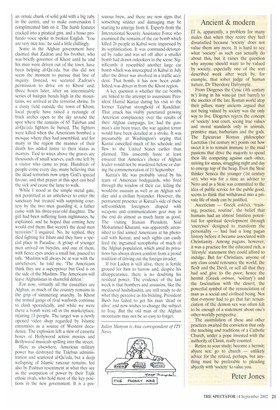Ancient & modern
IT is, apparently, a problem for many males that when they retire they feel dissatisfied because 'society' does not value them any more. It is hard to see what 'society' as such can actually do about this, but it raises the question why anyone should want to be valued by society, especially one of the sort described week after week by, for example, that sober judge of human nature, Dr Theodore Dalrymple.
From Diogenes the Opic (4th century BC) living in his wine-jar (not barrel) to the ascetics of the late Roman world atop their pillars, many ancients argued that not being valued by society was the only way to live. Diogenes rejects the concept of 'society' tout court, seeing true values and moral standards only in animals, primitive man, barbarians and the gods. The Epicurean Roman philosopher Lucretius (1st century BC) points out how sweet it is to remain immune to the mad passions that drive the majority to spend their life competing against each other, striving for status, struggling night and day to emerge top of the heap. Even the Stoic thinker Seneca the younger (1st century AD), who was for a time an adviser to Nero and as a Stoic was committed to the idea of public service for the public good, seems to think that withdrawal into a private life of study can be justified.
Asceticism — Greek askesis, 'training, practice, routine', the belief that humans had an almost limitless potential for spiritual development through 'exercises' designed to transform the personality — had had a long pagan history before it became associated with Christianity. Among pagans, however, it was a practice for the educated rich, a 'lifestyle' statement they could afford to indulge. But for Christians, anyone of any class could renounce the world, the flesh and the Devil, or sell all that they had and give to the poor; hence the hermit (Greek eretnos, 'solitary') and the fascination with the desert, the powerful symbol of the renunciation of man as a social and civilised being. Not that evoyone had to go that far: renunciation of the demon sex was often felt to be enough of a statement about one's other-worldly perspective.
The assimilation of these and other practices awaited the conviction that only the teaching and traditions of a Catholic Church, under a pope invested with the authority of Christ, really counted.
Retire to your study; become a hermit; abjure sex; go to church — unlikely advice for the retired, perhaps, but anything must be preferable to pleading abjectly with 'society' to value you.
Peter Jones










































































 Previous page
Previous page